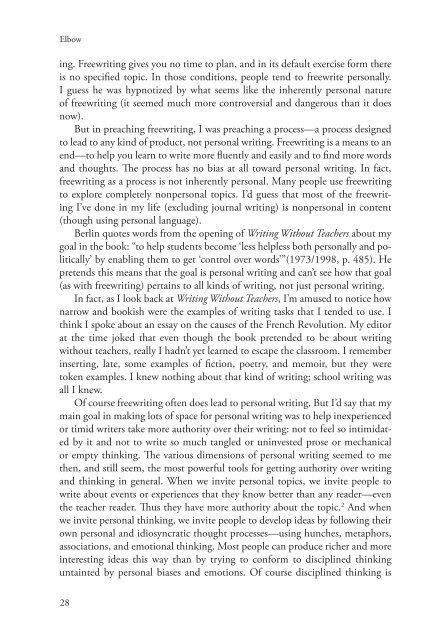Critical Expressivism- Theory and Practice in the Composition Classroom, 2014a
Critical Expressivism- Theory and Practice in the Composition Classroom, 2014a
Critical Expressivism- Theory and Practice in the Composition Classroom, 2014a
You also want an ePaper? Increase the reach of your titles
YUMPU automatically turns print PDFs into web optimized ePapers that Google loves.
Elbow<br />
<strong>in</strong>g. Freewrit<strong>in</strong>g gives you no time to plan, <strong>and</strong> <strong>in</strong> its default exercise form <strong>the</strong>re<br />
is no specified topic. In those conditions, people tend to freewrite personally.<br />
I guess he was hypnotized by what seems like <strong>the</strong> <strong>in</strong>herently personal nature<br />
of freewrit<strong>in</strong>g (it seemed much more controversial <strong>and</strong> dangerous than it does<br />
now).<br />
But <strong>in</strong> preach<strong>in</strong>g freewrit<strong>in</strong>g, I was preach<strong>in</strong>g a process—a process designed<br />
to lead to any k<strong>in</strong>d of product, not personal writ<strong>in</strong>g. Freewrit<strong>in</strong>g is a means to an<br />
end—to help you learn to write more fluently <strong>and</strong> easily <strong>and</strong> to f<strong>in</strong>d more words<br />
<strong>and</strong> thoughts. The process has no bias at all toward personal writ<strong>in</strong>g. In fact,<br />
freewrit<strong>in</strong>g as a process is not <strong>in</strong>herently personal. Many people use freewrit<strong>in</strong>g<br />
to explore completely nonpersonal topics. I’d guess that most of <strong>the</strong> freewrit<strong>in</strong>g<br />
I’ve done <strong>in</strong> my life (exclud<strong>in</strong>g journal writ<strong>in</strong>g) is nonpersonal <strong>in</strong> content<br />
(though us<strong>in</strong>g personal language).<br />
Berl<strong>in</strong> quotes words from <strong>the</strong> open<strong>in</strong>g of Writ<strong>in</strong>g Without Teachers about my<br />
goal <strong>in</strong> <strong>the</strong> book: “to help students become ‘less helpless both personally <strong>and</strong> politically’<br />
by enabl<strong>in</strong>g <strong>the</strong>m to get ‘control over words’”(1973/1998, p. 485). He<br />
pretends this means that <strong>the</strong> goal is personal writ<strong>in</strong>g <strong>and</strong> can’t see how that goal<br />
(as with freewrit<strong>in</strong>g) perta<strong>in</strong>s to all k<strong>in</strong>ds of writ<strong>in</strong>g, not just personal writ<strong>in</strong>g.<br />
In fact, as I look back at Writ<strong>in</strong>g Without Teachers, I’m amused to notice how<br />
narrow <strong>and</strong> bookish were <strong>the</strong> examples of writ<strong>in</strong>g tasks that I tended to use. I<br />
th<strong>in</strong>k I spoke about an essay on <strong>the</strong> causes of <strong>the</strong> French Revolution. My editor<br />
at <strong>the</strong> time joked that even though <strong>the</strong> book pretended to be about writ<strong>in</strong>g<br />
without teachers, really I hadn’t yet learned to escape <strong>the</strong> classroom. I remember<br />
<strong>in</strong>sert<strong>in</strong>g, late, some examples of fiction, poetry, <strong>and</strong> memoir, but <strong>the</strong>y were<br />
token examples. I knew noth<strong>in</strong>g about that k<strong>in</strong>d of writ<strong>in</strong>g; school writ<strong>in</strong>g was<br />
all I knew.<br />
Of course freewrit<strong>in</strong>g often does lead to personal writ<strong>in</strong>g. But I’d say that my<br />
ma<strong>in</strong> goal <strong>in</strong> mak<strong>in</strong>g lots of space for personal writ<strong>in</strong>g was to help <strong>in</strong>experienced<br />
or timid writers take more authority over <strong>the</strong>ir writ<strong>in</strong>g: not to feel so <strong>in</strong>timidated<br />
by it <strong>and</strong> not to write so much tangled or un<strong>in</strong>vested prose or mechanical<br />
or empty th<strong>in</strong>k<strong>in</strong>g. The various dimensions of personal writ<strong>in</strong>g seemed to me<br />
<strong>the</strong>n, <strong>and</strong> still seem, <strong>the</strong> most powerful tools for gett<strong>in</strong>g authority over writ<strong>in</strong>g<br />
<strong>and</strong> th<strong>in</strong>k<strong>in</strong>g <strong>in</strong> general. When we <strong>in</strong>vite personal topics, we <strong>in</strong>vite people to<br />
write about events or experiences that <strong>the</strong>y know better than any reader—even<br />
<strong>the</strong> teacher reader. Thus <strong>the</strong>y have more authority about <strong>the</strong> topic. 2 And when<br />
we <strong>in</strong>vite personal th<strong>in</strong>k<strong>in</strong>g, we <strong>in</strong>vite people to develop ideas by follow<strong>in</strong>g <strong>the</strong>ir<br />
own personal <strong>and</strong> idiosyncratic thought processes—us<strong>in</strong>g hunches, metaphors,<br />
associations, <strong>and</strong> emotional th<strong>in</strong>k<strong>in</strong>g. Most people can produce richer <strong>and</strong> more<br />
<strong>in</strong>terest<strong>in</strong>g ideas this way than by try<strong>in</strong>g to conform to discipl<strong>in</strong>ed th<strong>in</strong>k<strong>in</strong>g<br />
unta<strong>in</strong>ted by personal biases <strong>and</strong> emotions. Of course discipl<strong>in</strong>ed th<strong>in</strong>k<strong>in</strong>g is<br />
28


















